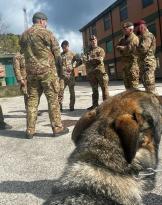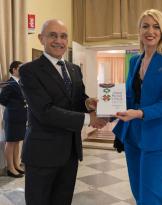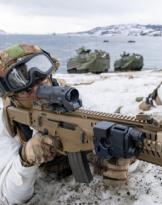The area in which it is important for Europe to put the maximum effort and attention now that the US geostrategic interest has shifted towards the Pacific.
This was the heart of the Seminar entitled Italy and the Sea between geopolitics, national security and economic strategy, which was held in the rectorate of the La Sapienza University of Rome on Wednesday 11 March and organized by the Department of Sciences policies.
The Magnificent Rector of the University Professor Eugenio Gaudio made the honors and greetings of the meeting, which highlighted how the University represents the most suitable place for the promotion of culture and training ground for the future national and European ruling class.
The purpose of the seminar was instead announced by Professor Fulco Lanchester - Director of the Department of Political Science “the seminar wanted to bring together at the table and bring together different realities linked by the sea, as the sole thread, to promote a moment of joint reflection on a plurality of issues relating to the strategic lines of development of the country's productive and security assets in the maritime dimension ".
Speakers at the seminar included many authoritative representatives of the country's scientific, economic, political and institutional world. Among these was Sen. Pier Ferdinando Casini - President of the Foreign Affairs Committee of the Senate; Sen. Nicola Latorre - President of the Senate Defense Commission; Sen. Massimo Mucchetti - President of the Senate Industry Committee; Hon. Domenico Rossi - Undersecretary of the Ministry of Defense.
An absolute novelty was the participation of the Ministry of the Environment and the protection of the Territory and the Sea which with the Hon. Undersecretary Silvia Velo specified: "this meeting opportunity represents a real new approach in the study and debate on economic strategies and on security policies related to maritime and sea. The key word that the Ministry of the Environment puts at the center of the debate is the balance between all economic and institutional realities and the interests at stake that develop through the sea resource. In the new strategy of the blue economy, Italy must play a main role ".
 In his very articulated speech, the Chief of Staff of the Navy, Admiral Giuseppe De Giorgi remarked how a series of factors lead us to highlight that the importance of the sea for Italy is fundamental. Italy is a maritime country and must be interested in protecting national maritime interests. To do this, the Navy is an enabling tool. Among the factors examined, the transition from a bipolar system to a multipolar system characterized by a friction between culturally, politically and economically diverse communities was highlighted; the consequences of globalization that have created interdependence between distant countries, which makes the effects of crises reverberate on a world scale. The displacement of the geopolitical and economic center of gravity towards the maritime environment is to be understood also in consideration of the fact that the 80% of all life on the planet develops in the seas and oceans; that over 65% of the world population lives less than 200 km from the coast; that in the last 10 years the 75% of countries has increased their maritime connectivity, confirming that the sea is the main means for productive, commercial and communication activities, as well as the preferential way to conduct operations aimed at favorably influencing a crisis , or to support populations affected by natural disasters. Interesting data provided by the admiral. The Mediterranean represents only 1% of the global water surface, but in it moves the 19% of world maritime traffic; the 30% of oil traffic; 65% of other energy resources destined for Italy and other European countries and represents an essential junction, crucial for maritime traffic. The Mediterranean has large amounts of recently discovered energy resources. However, the Mediterranean is also the theater of growing international instability, a link between the stable North and the conflictual South. The admiral also specified, in his speech, how the complex dynamics of the Mediterranean are closely interconnected with those of the "enlarged Mediterranean", a region that starts from the Mediterranean and extends eastwards to the Black Sea, the Middle East and - via Suez - the Red Sea, the Persian Gulf, the Horn of Africa, the Indian Ocean and, in the West - through Gibraltar - the Gulf of Guinea. Italy is a maritime country. The security, economy and prosperity of Italy depend on the guarantee of free and safe use of the sea.
In his very articulated speech, the Chief of Staff of the Navy, Admiral Giuseppe De Giorgi remarked how a series of factors lead us to highlight that the importance of the sea for Italy is fundamental. Italy is a maritime country and must be interested in protecting national maritime interests. To do this, the Navy is an enabling tool. Among the factors examined, the transition from a bipolar system to a multipolar system characterized by a friction between culturally, politically and economically diverse communities was highlighted; the consequences of globalization that have created interdependence between distant countries, which makes the effects of crises reverberate on a world scale. The displacement of the geopolitical and economic center of gravity towards the maritime environment is to be understood also in consideration of the fact that the 80% of all life on the planet develops in the seas and oceans; that over 65% of the world population lives less than 200 km from the coast; that in the last 10 years the 75% of countries has increased their maritime connectivity, confirming that the sea is the main means for productive, commercial and communication activities, as well as the preferential way to conduct operations aimed at favorably influencing a crisis , or to support populations affected by natural disasters. Interesting data provided by the admiral. The Mediterranean represents only 1% of the global water surface, but in it moves the 19% of world maritime traffic; the 30% of oil traffic; 65% of other energy resources destined for Italy and other European countries and represents an essential junction, crucial for maritime traffic. The Mediterranean has large amounts of recently discovered energy resources. However, the Mediterranean is also the theater of growing international instability, a link between the stable North and the conflictual South. The admiral also specified, in his speech, how the complex dynamics of the Mediterranean are closely interconnected with those of the "enlarged Mediterranean", a region that starts from the Mediterranean and extends eastwards to the Black Sea, the Middle East and - via Suez - the Red Sea, the Persian Gulf, the Horn of Africa, the Indian Ocean and, in the West - through Gibraltar - the Gulf of Guinea. Italy is a maritime country. The security, economy and prosperity of Italy depend on the guarantee of free and safe use of the sea.
 The need to protect the strategic interests of the Nation on the sea and from the sea arises from the detailed analysis, shared with the other interlocutors, and therefore the importance of the role of the Navy which must continue to maintain the ability to ensure strategic functions for the country promoting peace and maintaining security, through the use of the entire spectrum of capabilities expressed by the national maritime instrument; maritime defense of the national territory and communication lines; the protection of the freedom of navigation in the High Seas to allow the free circulation of people, goods, energy resources and information, essential for the development of the country's economy; the projection of military and humanitarian capabilities on land, to intervene in crisis / calamity situations or situations of extraordinary need and urgency, thanks to the intrinsic dual capacity of the naval instrument; the lawful and sustainable use of all available resources, from energy to food, which contribute to the development of the national economy; carrying out naval diplomacy, aimed at supporting foreign policy action and consolidating political-economic relations with foreign countries and, last but not least, the protection of compatriots abroad (of the 4,3 million resident abroad, approximately 85% live in coastal states or those reachable from the sea).
The need to protect the strategic interests of the Nation on the sea and from the sea arises from the detailed analysis, shared with the other interlocutors, and therefore the importance of the role of the Navy which must continue to maintain the ability to ensure strategic functions for the country promoting peace and maintaining security, through the use of the entire spectrum of capabilities expressed by the national maritime instrument; maritime defense of the national territory and communication lines; the protection of the freedom of navigation in the High Seas to allow the free circulation of people, goods, energy resources and information, essential for the development of the country's economy; the projection of military and humanitarian capabilities on land, to intervene in crisis / calamity situations or situations of extraordinary need and urgency, thanks to the intrinsic dual capacity of the naval instrument; the lawful and sustainable use of all available resources, from energy to food, which contribute to the development of the national economy; carrying out naval diplomacy, aimed at supporting foreign policy action and consolidating political-economic relations with foreign countries and, last but not least, the protection of compatriots abroad (of the 4,3 million resident abroad, approximately 85% live in coastal states or those reachable from the sea).
In his concluding remarks, the Chief of Staff highlighted how in the Mediterranean region the political, economic, religious, ideological and criminal pressures will increasingly find their scope on the sea (less controllable safety margins). Italy, the link between Europe, Africa and the Near East, due to its geographical position, culture and history, can be proposed as a guiding role in maintaining the balance of the area; natural referent for North African and Middle Eastern countries; enabling partner of the European Union and NATO in the work of dialogue and cooperation with the coastal countries. By decisively assuming this responsibility, Italy will be able to acquire greater international significance, also contributing to the recovery of the country's credibility; be supported by Europe in a project that gives the Mediterranean a priority and centrality in political choices; protect their vital interests in the Mediterranean. To support a credible Mediterranean foreign policy and protect its own interests, Italy must have a coherent military instrument to play, since peacetime, a primary role in advanced defense and security in the Region; ensure a constant work of presence, surveillance, deterrence and intervention capacity - also in terms of dialogue and military cooperation - in the Mediterranean and its enlarged dimension. The strategic role of the Navy for the welfare, prosperity and security of the Nation with the consequent need to maintain a balanced and modern aeronaval instrument, with characteristics of operational readiness, logistical self-sufficiency, command and control capacity, freedom of movement (thanks to the regime of the high seas), large size of ships and their seaworthiness capabilities, high cruising speeds, which meet the requirements of effectiveness, flexibility and modularity necessary both for military tasks and to ensure, since peacetime, the full range of activities to ensure the exercise of the widest action of the state on the sea.
The seminar was attended by a varied audience composed of scholars, experts and many students as it was in the organizers' aim, to extend maritime culture to the younger generations and to the future Italian and European ruling class and the attention on the sea as a strategic factor of development that Italy can no longer ignore. The seminar is part of the initiatives to promote the national maritime culture that stem from the collaboration that the Navy has long initiated with the most authoritative national training centers of excellence, such as the La Sapienza University of Rome.
Michele Carosella













